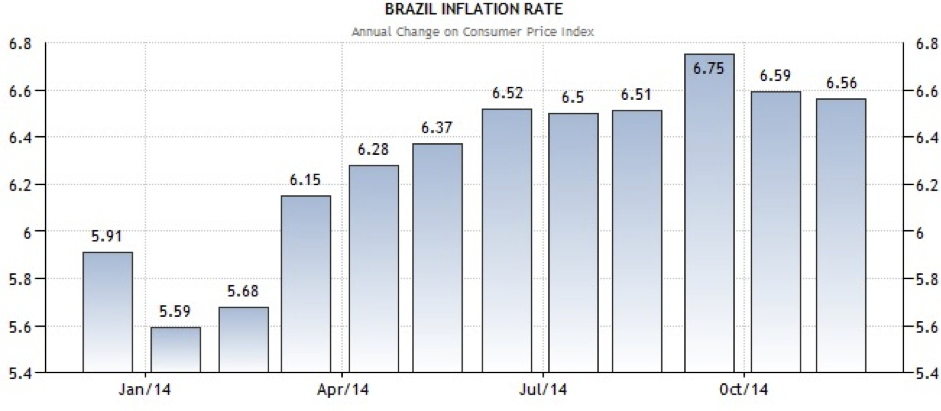 As of 1st January 2015, Dilma Rousseff was sworn in for her second term as president. From an economic standpoint, her first four years were almost uniformly criticised. The economy grew by just 6.7% during this time. Consumption was excessively encouraged, even though the country was already strained under a credit-fuelled consumer boom. Interest rates were cut even when inflation was accelerating and government spending was increased, despite a slowing of tax revenue.
As of 1st January 2015, Dilma Rousseff was sworn in for her second term as president. From an economic standpoint, her first four years were almost uniformly criticised. The economy grew by just 6.7% during this time. Consumption was excessively encouraged, even though the country was already strained under a credit-fuelled consumer boom. Interest rates were cut even when inflation was accelerating and government spending was increased, despite a slowing of tax revenue.
Drought in São Paulo State
In 2014, the Brazilian government received criticism for underestimating the worst drought in São Paulo state for 80 years, although the condemnation that the state government received, currently in opposition to Rousseff, was even more fierce. The state accounts for a third of Brazil’s economy and 40% of its industrial production. The water crisis severely reduced the output of sugarcane, São Paulo’s main cash crop, and coffee; it also pushed beef prices to record highs and added to Brazil’s inflationary woes.
If rainfall is below average during the rainy season (from November to February), as is being predicted by the government’s electrical grid operator, there is real fear of São Paolo drying out by February. Even hopes of a normal rainy season would return water levels back to normal in four or five years, analysts are predicting.
Petrobras Scandal
One issue that could have a big impact on Rousseff’s second term is the ongoing Petrobras corruption scandal. Executives of the state-oil giant allegedly conspired with construction companies to give kickbacks to politicians as bribes and campaign contributions. Since the March 2014 arrest of Paulo Roberto Costa, Chief of Refining 2004-2012, 35 executives have been indicted.
Most of these alleged bribe-taking politicians belong to Rousseff’s Workers’ Party. Furthermore, much of the corruption reportedly took place while Rousseff was the energy minister and chairwoman of Petrobras. Although there is no current evidence of her involvement, the city of Providence, Rhode Island, in the US has filed a case as an investor, naming Rousseff as a potential witness. The US Securities & Exchange Commission is conducting its own investigation into corruption.
Last Monday, Petrobras stated that its $24bn Petros employee pension fund might also be implicated, which has led to a freeze on payments to 23 contractors allegedly involved in the kickback scheme. Petrobras also alluded to a revised investment schedule in 2015 to avoid a cash squeeze caused by the corruption scandal and lower oil prices.
Commodities Market Decline
Petrobras stock sank to a 9-year low in December on the back of falling global oil prices, part of a broader sell-off which has marked the end of the commodity market super-cycle. Between 2000 and 2010, commodities experienced an unprecedented boom, with an explosion in Chinese demand underpinning the price spike. Brazil’s exports to China outpaced the increase in total exports by four times during this period.
Chinese growth rates have slowed recently, with imports falling by a surprising 6.7% in November. China’s central bank therefore cut interest rates in November 2014 for the first time since 2012. Global commodity prices have declined and so has the value of Brazilian exports to China. Chinese imports of soy, for example, represent over 40% of Brazil’s export.
Moreover, Brazil’s manufacturing sector has lost its competitive edge, especially to China. In May 2004, manufactured goods made up more than half of Brazil’s exports and commodities were less than a third. Now, industrialized goods have dropped to 37% and commodities make up almost half, meaning the economy is increasingly exposed to more volatile price swings in the commodity market.
Equity Market Volatility
The combination of all aforementioned factors has caused the stock market, Ibovespa, to end the year as the world’s most volatile, with a gauge reading of 26%. This reading, along with the 46% decline in crude oil price this year and the fact that commodity producers account for 24% of Ibovespa’s weighting, reiterates the problems associated with commodity market dependency. Petrobras’ 90-day volatility in 2014 was 86%, more than double the previous year.
Economic Review
Technically, Brazil’s economy is now out of a recession – third quarter GDP grew by a modest 0.1%, following two consecutive quarters of negative growth in the first half of the year. However, serious concerns remain, especially given that inflation accelerated throughout 2014, with November hitting 6.56% – which is outside the 6.5% upper boundary of the central bank’s 4.5% inflation target.

(Source: Trading Economics | Instituto Brasileiro de Geografia e Estatistica)
Since Rousseff’s election victory in October, the benchmark interest rate has risen from 11% to 11.75%, a sign that the central bank’s inflation target is being given serious attention. Brazil’s focus will be on implementing austerity measures in a bid to save its investment-grade credit rating, which is likely to be downgraded if its budget deficit doesn’t improve. Petrol prices have already gone up. Everything from higher electricity prices to lower unemployment benefits are expected in the future.
The Rousseff administration has also cut the 2015 growth forecast from 3% to 0.8%. It seems that the coming year will be one of considerable belt-tightening.

